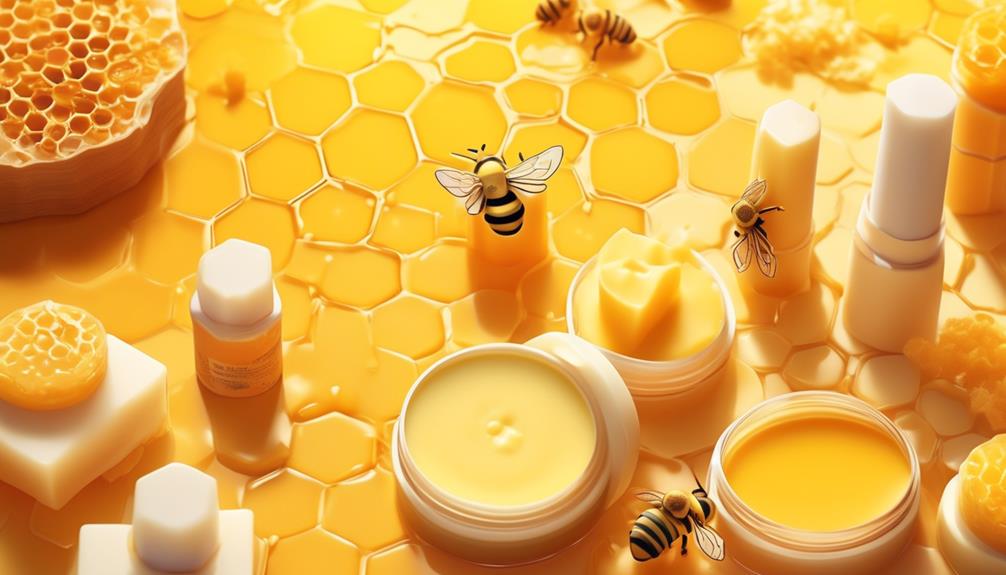Find out if beeswax, a seemingly harmless substance, could be a surprising trigger for your allergies.

Can You Be Allergic to Beeswax?
Navigating the sea of potential allergens can be a daunting task, and you might not have considered the humble beeswax as a possible culprit. Yet, you know better than anyone that allergies can be as individual as fingerprints, and what's perfectly harmless to one person might be a serious trigger to another.
So, could you be allergic to beeswax? It's an intriguing question that's not as straightforward as it might seem, and exploring it could lead you down a path of better understanding your own body's unique responses. Stick around, as this is a journey worth embarking upon.
Key Takeaways
- Beeswax allergies are a rare but possible hypersensitive reaction of the immune system to substances in beeswax.
- Symptoms of beeswax allergies can range from mild skin reactions to severe respiratory issues and potentially life-threatening anaphylaxis.
- Beeswax is found in various everyday products such as cosmetics, skincare products, and candles, and is used for its stabilizing and emulsifying properties.
- Diagnosing a beeswax allergy involves identifying specific symptoms, undergoing skin tests and blood tests, and consulting with an allergist for a tailored treatment plan.
Understanding Beeswax Allergies

To comprehend beeswax allergies, it's crucial to understand that they're a hypersensitive reaction your immune system has to the substances in beeswax. When your body detects these substances, it mistakenly perceives them as harmful invaders. Your immune system then produces antibodies, particularly immunoglobulin E (IgE), as a protective response. This reaction triggers the release of chemicals, including histamine, which cause allergy symptoms.
Your symptoms can vary significantly depending on your sensitivity. Mild symptoms may include skin rashes, hives, and itching, while severe reactions can lead to anaphylaxis, a life-threatening condition that requires immediate medical attention. It's important to mention that beeswax allergies are relatively rare. However, those with a known hypersensitivity to honey, propolis, or bee venom may have a higher risk.
To diagnose beeswax allergies, your healthcare provider may conduct skin tests, blood tests, or both. They'll expose a small area of your skin to a diluted allergen and observe your body's reaction. With this information, they can devise a treatment plan that may include avoidance, medication, or immunotherapy.
Common Symptoms of Beeswax Allergy

Manifestations of beeswax allergy can range from mild to severe, often presenting as skin irritations, respiratory issues, or even life-threatening anaphylactic reactions. Your skin might react with hives, redness, itching, or swelling upon exposure to beeswax. You could experience respiratory symptoms like wheezing, coughing, and a tight chest. More severe reactions may involve anaphylaxis, a potentially fatal systemic reaction that requires immediate medical attention.
Here's a quick rundown of the common symptoms:
Symptom | Description |
|---|---|
Skin reactions | Hives, redness, itching, and swelling |
Respiratory issues | Wheezing, coughing, tightness in the chest |
Anaphylaxis | Rapid pulse, dizziness, difficulty breathing, loss of consciousness |
It's important to note that not everyone will experience these symptoms, as the severity and type of allergic reactions can vary widely from person to person. If you suspect you're allergic to beeswax, it's crucial to get tested by a healthcare professional. They can provide an accurate diagnosis and advise you on the best course of action to manage your allergy.
Products Containing Beeswax

You might be surprised to learn how many everyday items contain beeswax, from cosmetics and skincare products to candles and even certain foods. Beeswax acts as a stabilizer and emulsifier, contributing to the texture and longevity of products. It's a key ingredient in lip balms, lotions, and makeup because of its hydrating properties and ability to help protect and repair rough, dry, or chapped skin.
In the culinary world, beeswax is often used as a coating for cheese to prevent it from drying out. It's also found in food wraps as a sustainable, reusable alternative to plastic wrap.
Beeswax candles are another common product. They're prized for their long, clean burn and natural, sweet aroma. Unlike paraffin candles, which can release potentially harmful chemicals, beeswax candles are considered a safer, more natural option.
Even in the world of woodworking, beeswax plays a part. It's often used as a finish for wooden furniture, providing a protective, soft-sheen surface.
Diagnosing a Beeswax Allergy

Given the widespread use of beeswax in various products, it's crucial to identify if you're allergic to it, which begins with understanding the process of diagnosing a beeswax allergy. Generally, the diagnosis involves looking out for specific symptoms, undergoing skin tests, and sometimes getting blood tests.
If you experience symptoms such as skin rashes, hives, or difficulty breathing when exposed to beeswax, it could be an indicator of an allergy. However, these symptoms aren't exclusive to a beeswax allergy, so further testing may be required.
Symptoms | Skin Test | Blood Test |
|---|---|---|
Skin rashes, hives | Positive reaction | Elevated IgE levels |
Difficulty breathing | Positive reaction | Elevated IgE levels |
A skin test involves applying a small amount of beeswax on your skin and observing for reactions. A positive reaction is usually a raised, red bump.
For a more definitive diagnosis, a blood test may be carried out to measure the level of immunoglobulin E (IgE), an antibody that your body might produce in response to an allergen. Elevated IgE levels could indicate an allergic reaction.
Managing and Treating Beeswax Allergies

Navigating through a beeswax allergy requires a robust approach that includes avoidance of exposure, prompt symptom management, and proper medical treatment.
You must vigilantly read product labels as beeswax is commonly found in cosmetics, foods, and pharmaceutical products. Avoidance isn't just limited to products, you should also steer clear of environments where beeswax is processed.
When exposure is unavoidable, managing symptoms promptly is crucial. If you're experiencing mild reactions such as hives or itching, over-the-counter antihistamines may help. For severe reactions like difficulty breathing or anaphylaxis, immediate medical attention is necessary. Always have an epinephrine auto-injector on hand if you're at risk of severe reactions.
Lastly, consult with an allergist for a tailored treatment plan. They can recommend immunotherapy, a long-term solution that involves regular injections of small amounts of the allergen to build up immunity. Remember, self-medication isn't advisable, and professional medical advice is the safest route.
Frequently Asked Questions
Are There Any Other Types of Wax That Can Cause Similar Allergies as Beeswax?
Yes, you can be allergic to other types of wax like paraffin and soy wax. Similar to beeswax, these waxes contain substances that can trigger an allergic reaction in some people. Symptoms can include skin irritation, redness, and swelling.
Always patch test a new wax product on a small area of your skin before full use. If you're experiencing severe reactions, it's best to consult with a healthcare professional.
How Common Is Beeswax Allergy in the General Population?
It's not entirely clear how common a beeswax allergy is in the general population. There's not a lot of data on this, as it's not a routine allergy test.
However, if you're noticing a reaction after using products with beeswax, you may have a sensitivity or allergy. It's best to get tested by a healthcare provider to confirm.
Can Beeswax Allergy Be Outgrown or Does It Generally Last a Lifetime?
Yes, you can outgrow a beeswax allergy, but it's not guaranteed. Allergies change over time, and your immune system may eventually stop reacting to beeswax.
However, it's also possible that the allergy could last a lifetime. It's crucial to regularly consult with an allergist to monitor your condition.
Don't try to test your tolerance to beeswax on your own, as allergic reactions can be severe and potentially life-threatening.
What Are Some Alternative Products to Use if One Has a Beeswax Allergy?
If you're allergic to beeswax, you'll need to find alternatives for products that commonly contain it. Instead of beeswax candles, opt for soy or paraffin ones.
For skincare, look for products that use plant waxes or oils like jojoba or shea butter. Lip balms often contain beeswax, so you'll need to find ones that use alternatives like carnauba or candelilla wax.
Always check labels to ensure you're avoiding beeswax in all its forms.
Are There Any Specific Professions or Hobbies That Increase One's Risk of Developing a Beeswax Allergy?
Yes, certain professions or hobbies can increase your risk of developing a beeswax allergy. If you're a beekeeper, candle maker, cosmetic producer, or hobbyist in related fields, you're often in contact with beeswax. Regular exposure can lead to an allergic reaction over time.
Similarly, artists using encaustic painting techniques, which involve heated beeswax, might also be at risk.
It's important to use protective gear and monitor any changes in your health.
Conclusion
So, can you be allergic to beeswax? Yes, you can. It's not common, but it's possible.
If you're experiencing symptoms like skin irritation or respiratory issues after exposure to beeswax products, you could be allergic. It's important to seek a diagnosis from a healthcare professional.
Managing a beeswax allergy involves avoiding products containing beeswax and treating symptoms as they occur.
Stay informed, vigilant, and remember, your health comes first.


